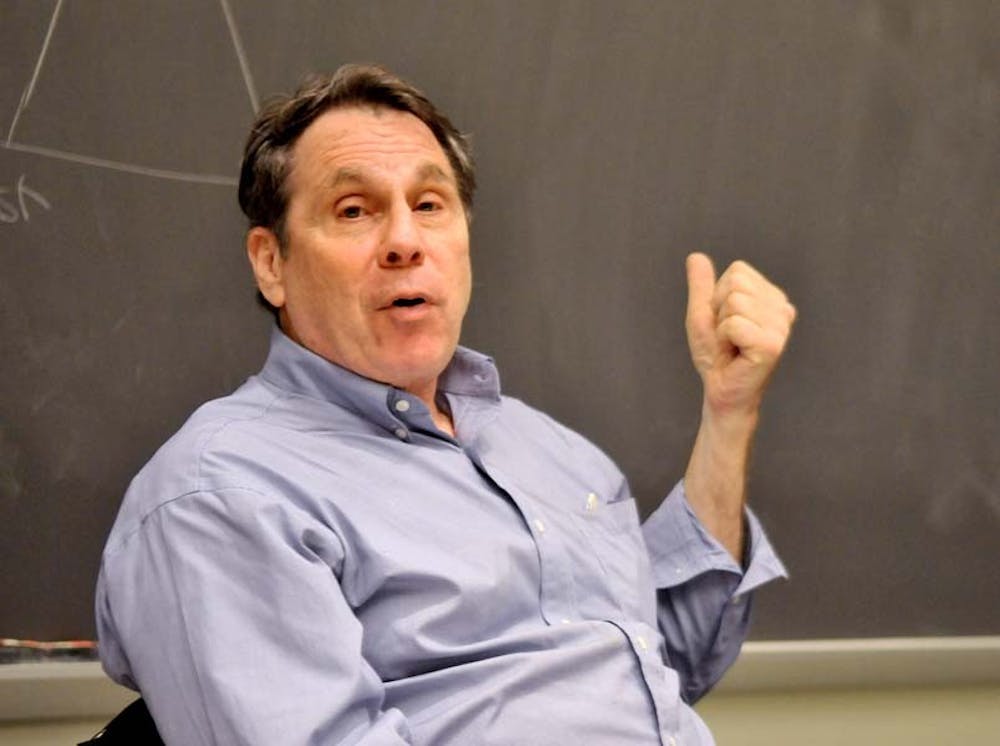
While today’s most heated issues in Washington are gun control and counterterrorism, health care reform still demands ongoing discussion for some students.
The Penn Government and Politics Association hosted professor Sandy Schwartz Tuesday evening for a debate on President Obama’s Affordable Care Act, also known as Obamacare.
Schwartz is the Leon Hess Professor in Internal Medicine, and also teaches health care management in Wharton.
“Health care is so political in ways that people don’t often understand or are aware of,” said College freshman and Daily Pennsylvanian senior photographer Imran Cronk, a GPA member who helped organize the event. “Schwartz is learned in both areas, so he crosses the divide very well.”
Schwartz began the debate by emphasizing the fact that health care is extremely political. He discussed the three aspects of the health care system — the seemingly impossible task of minimizing costs while maximizing access and quality. The methods of successfully achieving all three are the prime reason for the maelstrom of politics that surround health care reform.
Schwartz described Obamacare as a hybrid system, and a compromise of the Democratic Party. He mentioned the obvious similarities between Obamacare and the health care system implemented in Massachusetts by Republican Governor Mitt Romney.
However, he also emphasized that the Affordable Care Act wasn’t a bipartisan bill. While Democrats spent a year trying to canvass Republican votes for the bill, Schwartz joked, “I think if Jesus himself proposed the plan, the Republicans would have opposed it.”
According to Schwartz, Obamacare touches on access and quality, but like most things in Washington, it’s centered around money. He explained that, in fact, not everyone would be covered under Obamacare, including undocumented citizens, those not covered under expansions of Medicaid and the families of the working poor.
Schwartz also looked at the opposing side of the debate. Some people believe that the government should stay completely out of health care, but Schwartz argued that the government’s role in the health care system is to curb the unsustainable costs of the current system.
Obamacare aims to regulate the insurance industry by setting rules and parameters that dictate what can and cannot be covered, Schwartz said.
“I always say a healthy person has not had enough tests,” he added. “Every system behaves in the way it was designed to behave.”
Schwartz explained that the current health care system pays doctors more when they see more patients. The Affordable Care Act would instead provide a flat amount of money for a specific period of time to perform necessary tests in the way doctors saw fit.
Schwartz said the risk of this, however, was that doctors might limit the amount of care to less than what was necessary.
Schwartz also talked about the implications of Obamacare in the future.
“The devil is in the details, and the details haven’t been written,” he said. “The rules are going to change as we go along.” He added that Obamacare will be the biggest change in health care for about the next 30 years and predicted that over time, people will not want to see the Affordable Care Act rescinded, but will rather push for improvements in quality and lower costs.
“I think it’s healthy to have these kinds of conversations about the challenges of the health care system and how Obamacare benefits or harms certain groups of people,” College sophomore Larry Liu said of the debate.
College freshman Nicholas Zarra appreciated Schwartz’s unbiased approach to the debate. “He differentiated between the good and bad of the act without subjecting it to political polarization.”
The Daily Pennsylvanian is an independent, student-run newspaper. Please consider making a donation to support the coverage that shapes the University. Your generosity ensures a future of strong journalism at Penn.
DonatePlease note All comments are eligible for publication in The Daily Pennsylvanian.




